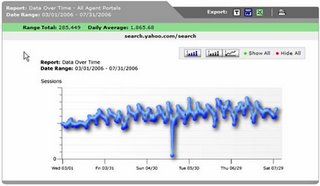Future of the MLS
Brian Larson, just wrote a 3 part series for Inman News on the Future of MLS without interbroker compensation. It's a great read. In part 3 that was published today, he discusses a potential new model he calls FLS, Future Listing Services. He notes most MLS participants percieve the main value in of the MLS lying in lisiting and data organization and management, rather than in the core purpose, interbroker compensation. Without interbroker compensation, he discusses what an FLS might look like.
It is important to note that Larson states, "...I suspect that readers will find as many solutions as they will problems and will probably offer more compelling potential models as well." So he is not trying to provide the definitive model, but I want to talk about a couple fascinating talking points.
The first question Larson asks: "What if as FLS merely viewed itself as an aggregator and distributor of listings on behalf of brokers?"
- Why would Larson limit this description to brokers.? More and more consumers want to participate in the selling of their home. It seems that an FLS would need to consider consumer, FSBOs, in some capacity if it wants to be an authoritative source of homes for sale. Many MLSs will include FSBO listings today. Well the reason Larson provides is one of data quality. The FLS would have no leverage over the one time consumer in its quality control efforts. But according to one of his own solutions, if some data is backfilled, or corrected, by checking 3rd party sources such as public record, many potential missing data points such as sold price, date etc, can be eventually updated. Secondly, I feel that the power of online community can compel most people to voluntarily participate in a desired way. You don't have to look much further than Craigslist to see this.
More importantly is the issue of representation. What does allowing FSBO's to enter data into an MLS or FLS do to the organized real estate industry? I don't have the answer for that but my feeling is that the way to connect all home sellers and buyers to organized real estate is to ensure they use the same interconnected platform rather than having them go to 3rd party solutions such as Craigslist, FSBO.com and any myriad of the FSBO or classified search engines available today. For every FSBO that eventually lists through a Realtor, there are ones that are successfully selling their own home.
Larson discusses access. His idea is that an FLS would provide free access to brokers and the public to view listings, but visitors must register. My first reaction is that this makes the FLS a second class source to vertical search engines that do not require registration. Why require visitors to register? The data is out there, it has been liberated and in my opinion that train has left the station. Now, if registration is something that the industry just must have, the issue of user adoption can probably be solved by using solutions such as federated identities, allowing users to use accounts they already have for other online services.
The 3rd set of comment I have to mention are those of listing control.
"The principal broker in each listing firm can pick and choose which registered recipients receive that brokerage's listings, checking a box for each entity she wants to receive the data... If a broker does not like the way a data recipient is using her data, she can complain to the recipient, and if dissatisfied, she can stop sending her listings to that recipient..."
Cooperating brokers in an FLS with full control. There is no discrimination of any kind. Brokers own the listings and in order to use a broker's listing content, a party needs to maintain a good relationship with that broker. This is exactly the reasoning that lead to the development of Point2's Handshake platform. And now other's like Mr. Larson are talking about the very problems it solves and the sense that it makes.
t
Future MLS, Point2 Agent Handshake, Brian Larson

